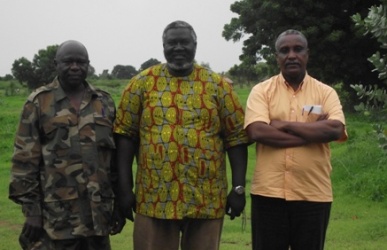SPLM-N leader urges international community to put pressure on Sudanese regime
February 20, 2016 (KHARTOUM) – The chairman of the rebel Sudanese People’s Liberation Movement/North (SPLM-N) Malik Agar has appealed to the international community to put pressure on the Sudanese government to achieve comprehensive peace in the country.

He demanded the international community to have the courage to confront the injustice exercised by the Sudanese government against its people, asking it to meet its commitment towards the Sudanese communities affected by the injustice.
Agar said the Sudanese youth, women and opposition forces were subjected to various forms of injustice by the regime, urging them to build on those commonalities to reform or change the regime in order to achieve justice and democracy.
He said that change is “inevitable”, pointing the SPLM-N was pushed by the systematic injustice to engage in war with the regime, noting they recognize the dangers of the armed resistance and its negative impact on people’s lives and the economy.
South Kordofan and neighbouring Blue Nile state have been the scene of violent conflict between the SPLM-N and Sudanese army since 2011.
Last December, negotiations between Khartoum and the SPLM-N stalled after the government delegation insisted that the objective of talks is to settle the conflict in the Two Areas, while the SPLM-N team has called for a holistic approach to resolve ongoing conflicts across Sudan.
Agar added the SPLM-N opted for the comprehensive peaceful settlement approach following 50 years of injustice in Sudan, saying the peaceful solution is crucial to build a society that is based upon social justice, human rights and democratic values.
The SPLM-N leader accused the President Omer al-Bashir of compromising the interests of the Sudanese people to avoid criminal prosecution while on the other hand pretends to fight against terrorism.
It is worth to mention that the International Criminal Court (ICC) issued two arrest warrants for Bashir in 2009 and 2010 charging him with war crimes, genocide and crimes against humanity in Sudan’s western region of Darfur.
Agar accused unnamed circles in the international community of appeasing Bashir and his regime for his cooperation in the fight against terrorism, describing those circles as “corrupt”.
It is worth to mention that the International Criminal Court (ICC) issued two arrest warrants for Bashir in 2009 and 2010 charging him with war crimes, genocide and crimes against humanity in Sudan’s western region of Darfur.
Agar further urged the international community to condemn the Sudanese regime, saying Sudan deserves peace, dignity, freedom, human rights, unity in diversity and the good governance.
Agar said that the conflict in Sudan would only be brought to an end by the true comprehensive national dialogue, saying that dialogue begins by ceasing hostilities and allowing access humanitarian access to the war-affected areas.
He said that dialogue can’t be held while the government is shelling the same people involved in the dialogue, pointing to human rights abuses, media censorship and political detainees.
Agar added that the agenda of the ongoing internal dialogue was put by the ruling National Congress Party (NCP) to achieve specific objective, saying it would neither bring the war to an end nor achieve permanent peace.
The SPLM-N leader further pointed the internal dialogue wouldn’t improve the deteriorating economy or offer and answer to the question of how Sudan should be governed and hence will never achieve social justice.
The internal dialogue conference was inaugurated in Khartoum on October 10 th, 2015 amid large boycott from the major political and armed opposition.
The political forces members of the opposition alliance National Consensus Forces (NCF) and other parties refuse to take part in the dialogue conference before the creation of a conducive environment and the implementation of specific confidence-building measures provided in a roadmap proposed by the African Union mediation team.
Some significant political parties, such as the National Umma Party, the Reform Now Movement and the Just Peace Forum, that approved the process in the beginning. But later they suspended their participation, criticizing the government refusal to postpone the general elections and the lack of political freedoms.
Also, the major armed movements in Darfur, South Kordofan and Blue Nile refrained from participating in the dialogue conference citing similar demands.
(ST)
